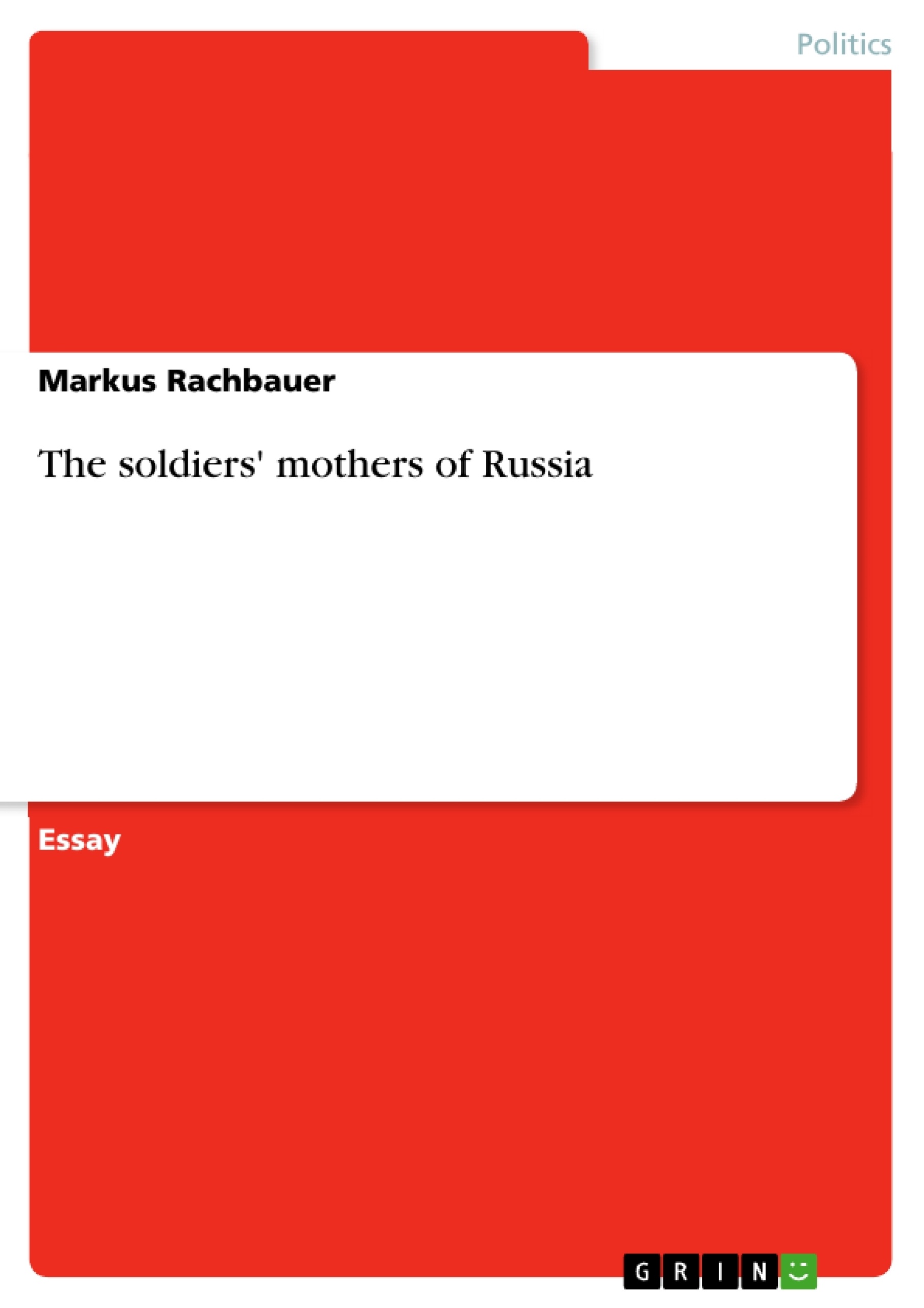The Russian state has faced a deep transformation since the beginning of the 1990s. The society moved from a dictatorial regime to a formal democracy. The military has been a problem in Russia since the times of the Soviet Union. Violence, abuses, suicides etc. are the result of the traditional military system. During the final stage of the Soviet Empire protest against the miserable conditions in the army was entered by a small number of mothers of young soldiers. This essay is about the non governmental organisation of the Soldiers' Mothers of Russia, which is one of the most important and successful human rights organisations in Russia. The first chapter of this Essay will be about the establishment of the Soldiers' Mothers and the societal conditions which enabled it. Chapter two is about the Status quo of the Russian Army, about the violence against and abuses of young conscripts and about the associated hierarchical military system. Also structural and legal shortcomings of the military will be described. The third chapter deals with the goals and demands of the Soldiers' Mothers of St. Petersburg, chapter four will be about the working methods of the organisation and the ways of embarking their goals.
Inhaltsverzeichnis (Table of Contents)
- 1. The Establishment of the Soldiers' Mothers
- 2. Status Quo of the Russian Army
- 3. Targets of the Soldiers' Mothers organisation (St. Petersburg)
- 4. Methods and forms of protest
- 5. Conclusion
Zielsetzung und Themenschwerpunkte (Objectives and Key Themes)
This essay examines the Soldiers' Mothers of Russia, a prominent human rights organization that emerged in response to the persistent issues of violence, abuse, and suicides within the Russian military. The essay delves into the societal context that facilitated the organization's formation, scrutinizes the realities of the Russian army, and investigates the goals, methods, and impact of the Soldiers' Mothers movement.
- The rise of the Soldiers' Mothers organization in Russia
- The prevalent issues of violence and abuse in the Russian army
- The goals and strategies of the Soldiers' Mothers of St. Petersburg
- The broader societal implications and impact of the Soldiers' Mothers movement
- The organization's efforts to advocate for human rights within the Russian military
Zusammenfassung der Kapitel (Chapter Summaries)
- Chapter 1: Explores the socio-political environment that led to the establishment of the Soldiers' Mothers organization, highlighting key events such as the stagnation under Brezhnev, the war in Afghanistan, and the period of perestroika and glasnost under Gorbachev. It also discusses the organization's initial formation in response to widespread human rights abuses within the military.
- Chapter 2: Provides a detailed analysis of the existing conditions within the Russian army, focusing on the prevalence of violence, abuse, and suicides. It delves into the historical roots of these issues, specifically mentioning the practice of "Dedovshchina," and examines the structural and legal shortcomings that perpetuate such problems within the military.
- Chapter 3: Examines the objectives and demands of the Soldiers' Mothers of St. Petersburg, highlighting their unique approach to reform. It explores their refusal to cooperate with the military and their broader advocacy for a more democratic society, emphasizing their aim to eliminate conscription and build a military system that respects human rights.
- Chapter 4: Focuses on the methods and strategies employed by the Soldiers' Mothers organization to achieve their goals. It discusses their modes of protest, their relationship with the military and government, and their efforts to bring about change through advocacy, awareness raising, and legal interventions.
Schlüsselwörter (Keywords)
The essay revolves around the Soldiers' Mothers of Russia, their advocacy for human rights in the military, and their role as a significant force for change within the Russian society. Key concepts include Dedovshchina, conscription, abuse, violence, human rights, reform, and the broader context of societal transformation in post-Soviet Russia.
Frequently Asked Questions
Who are the "Soldiers' Mothers of Russia"?
It is a prominent non-governmental human rights organization in Russia that advocates for the rights of conscripts and exposes abuses within the military.
What is "Dedovshchina"?
It refers to a systemic practice of hazing, violence, and abuse of junior conscripts by senior soldiers within the Russian armed forces.
What are the main demands of the organization?
The organization demands the elimination of conscription, better legal protection for soldiers, and a transition to a more democratic and professional military system.
In what context did the Soldiers' Mothers movement emerge?
It emerged during the late Soviet era (Perestroika and Glasnost) as a response to the miserable conditions in the army and the trauma of the war in Afghanistan.
How does the organization protest against military abuses?
They use legal interventions, public awareness campaigns, and direct advocacy for families of soldiers to challenge the hierarchical military system.
- Arbeit zitieren
- Markus Rachbauer (Autor:in), 2007, The soldiers' mothers of Russia, München, GRIN Verlag, https://www.grin.com/document/93991



